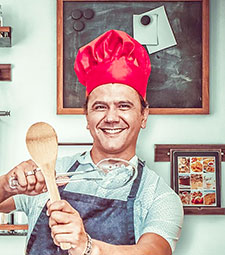 *
*
I was glad to catch up with Robson Lemos, a chef and now a theater producer. He is one of the many artists in “The Paris of New England” who have an interesting and eclectic background.

Doug Holder: How did you discover Somerville, and how has it been for you?
Robson Lemos: I arrived in the USA in 2004. For an immigrant, it is difficult to build the feeling of belonging. In 2007, I came to visit a friend at Union Square in Somerville and there was a summer festival going on. The artist on stage was Brazilian and invited me to sing a song, and from there I fell in love with the city.
The following year I moved to the city and started participating in various artistic events in the city. Somerville is a city that not only offers spaces for artists but also for immigrant artists, and that is why I have always felt welcome.
In 2015 I was invited to participate in a culinary course in the city. So I started to participate in several events in the city as a chef. I am part of the culinary group “Nibble Kitchens” in Somerville.
DH: You are from Brazil, but you often say you are from the Brazilian state, Bahia. Is there different cultural feel to Bahia?
RL: I always say I am from Bahia, but when I participate in international interviews it is difficult to explain deeply about Brazilian culture so I talk more about Brazil in general. But Bahia, in particular, is the Brazilian state with the largest black concentration outside Africa. Although I am not black, here in the USA I am considered a person of color. I grew up within an Afro-Brazilian culture.
DH: You are an actor?
RL: Yes, I am an actor and that is my great passion. My first contact with theater I was 13 years old and it was through a method called: theater of the oppressed. I discovered that we are all oppressed in some way and the basis of creation is in the breakdown of oppression. So being an actor for me is to express, create, speak and use art as a form of education.
In 2020, in the middle of the pandemic, we had the Black Lives Matter Movement and the mayor of Somerville declared that racism is a matter of public health.
I identified with this statement because in addition to being an artist and a chef, I also work in an organization called the Massachusetts Alliance of Portuguese Speakers and became a community health worker. In various training courses I realized how the racial issues interfere with public health issues.
Using art and education as an instrument of empowerment would initially be a good way to combat racism.
DH: Tell us about the play you are working on?
RL: In Omolu I bring African mythology to tell a story of discrimination.
Omolu was an African God who was abandoned by his mother and lived wandering around Africa. He had a skin disease and covered his whole body with straw.
Omolu traveled around many lands and met several other gods and nobody accepted him until he was found by YEMANJA, queen of the sea. She adopted Omolu as her son and healed her wounds with seawater. Oxala, the father of all, recognized Omolu as the god of healing.
Omolu is a history of inclusion using elements of African mythology with a Brazilian touch. Initially, I thought it would be a concert but because of the pandemic I decided to make the recordings separately, as a form of documentary. This project involves theater, music, dance, capoeira, visual arts, culinary, and political speeches with history teachers.
We started doing outreach in December, rehearsals in January, recording thematic in February and editing in March.
My intention is to offer this project as a gift to the city of Somerville, so that future generations know that Somerville welcomes and includes all the stories, my story and the story of Omolu.
Brazil has the largest black population on the American continent and obviously reflects a lot on cultural expression. As in the USA, Brazil faces problems with racism. The Black Lives Matter movement will also influence racial movements in Brazil in the future.















Reader Comments